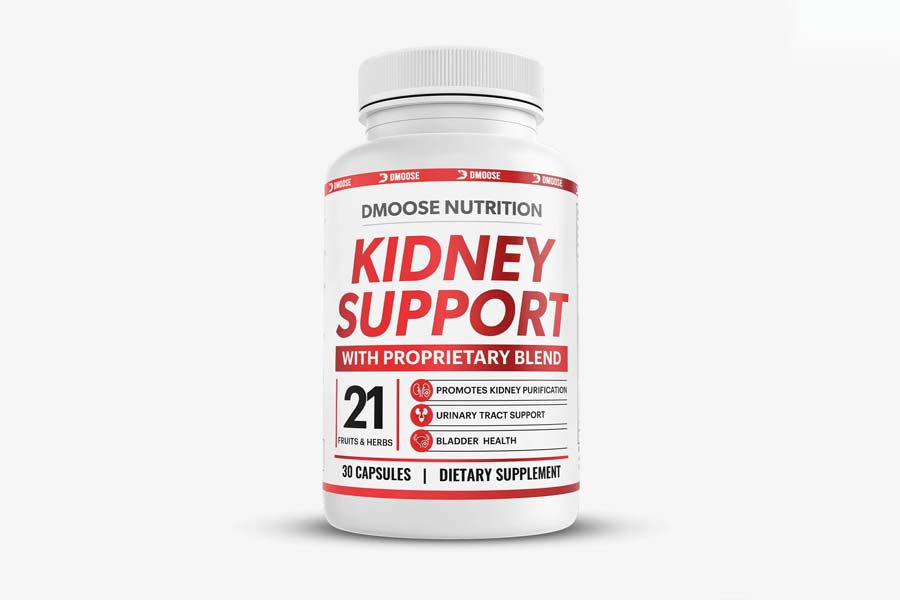Hey, if you are a responsible adult and want to take care of your well-being, pay attention to this! Many of you think exercise is the only thing that'll fix your health and fitness issues, but you need to consume the right balance of nutrients too. Nutrients provide the body with the necessary ingredients to function correctly. The right type of nutrients can also aid in maintaining a healthy weight, essential for avoiding health problems and diseases.
Protein, minerals, and vitamins are critical nutrients for healthy health. While many people get their required nutrients from the foods they consume daily, individuals with certain kidney conditions, such as kidney disease and kidney failure, may struggle to absorb and process the nutrients they consume.
Additionally, they may need to avoid certain foods that would otherwise provide them with the essential nutrients they need. In such cases, dietary supplements can help compensate for the lack of nutrients, ensuring their body remains healthy and functioning correctly.
It's worth noting that kidney disease is a more common condition than many people realize, affecting a significant portion of the population. Worse, many individuals with this condition may not even realize it, as symptoms can be vague or non-existent until the disease progresses to a more advanced stage.
Furthermore, over-the-counter (OTC) medications, prescribed medicines, and even some dietary supplements can harmfully impact the kidneys and cause their function to finishing. Therefore, those with any condition affecting their kidneys must exercise caution and take measures to protect their health.
It is advisable to seek advice from your doctor before beginning any new supplement or vitamin regimen, as each person's body is unique. During the consultation, you must discuss with your doctor the medications you are taking, any existing medical conditions or diseases, and your lifestyle to ensure that the supplements will not adversely affect your health.
If there is a family history of kidney disease, disclosing this information to your doctor and any other relevant factors is essential. Even if your kidneys are healthy, discussing with your doctor which supplements are suitable for your diet is crucial to avoid any potential health risks.
Related Article: Hydration is Linked to a Lower Rate of Chronic Disease & Dying Early, According to a Latest Research
What Are Supplements for Kidney Health?
Supplements designed to promote kidney health come in many forms, some of which may benefit your kidneys while others may not. The supplement industry, including over-the-counter and prescription-based products, is lucrative due to the extensive range of supplements available.
These supplements can vary in shape, size, and form, with some designed to add a single nutrient to your diet. In contrast, others are formulated as multivitamins to combine nutrients. Herbal products are also considered dietary supplements that can support kidney health.
Individuals with kidney disease may require specialized supplements tailored to their condition. These supplements are typically available by prescription from a healthcare provider who can customize the supplement regimen to meet the individual's specific needs.
This approach helps ensure that the supplements do not contain unwanted nutrients that could cause further harm to the kidneys.
In addition to specialized supplements, there are several commonly recommended vitamins and minerals for kidney health, including thiamin (B1), riboflavin (B2), niacin (B3), pantothenic acid (B5), folic acid, cobalamin (B12), pyridoxine (B6), biotin, vitamin C, and vitamin A.
However, there is a debate about the efficacy of these vitamins in promoting kidney function, with conflicting opinions on which ones are genuinely beneficial.
Therefore, it is essential to consult with a doctor before adding any supplements to your discipline. They can help assess which supplements benefit you most based on your needs and health status.
Related Article: Vitamins and Minerals That You Should Take Daily
When to Take Kidney Supplements?
Suppose you are dealing with kidney disease or any other condition that impacts the kidneys. In that case, it is crucial to understand when and whether you should consider taking supplements targeted at kidney health.
Healthcare providers may recommend B complex vitamins and vitamin C supplements for individuals with kidney disease. Still, the exact dosage and frequency may require a prescription tailored to the patient's needs.
In cases where anemia is caused by kidney disease, patients may need to take iron supplements as either pills or injections. However, it's essential to consult a doctor before taking iron supplements to ensure they are safe and appropriate for your situation.
In some cases, patients with high blood phosphorus levels may need to take medications, such as calcium supplements, to help absorb phosphorus from their food.
While there are debates surrounding using supplements for kidney disease, some healthcare providers agree that dialysis patients may benefit from supplements. However, it's important to note that there needs to be more consensus on which supplements are appropriate and effective in these cases.
Therefore, individuals should seek guidance from their healthcare provider before taking any supplements, especially if they have kidney disease or are undergoing dialysis.
Are Kidney Supplements Safe?
For individuals with unhealthy kidneys, particularly those with chronic kidney disease, it's essential to avoid certain supplements like vitamins A, D, E, and K, which can accumulate in your system and potentially harm your kidneys, which are already struggling to filter out excess buildup.
Moreover, once you start receiving dialysis treatment, your supplements may need to be modified. It's crucial to consult with your doctor since each individual's circumstances are unique.
Your doctor will conduct tests like physical exams, urine tests, and blood work to determine if the dietary supplement regimen works for you. Depending on your kidney function, they can adjust your medications if necessary.
You should avoid specific supplements for kidney disease, including chromium picolinate, creatine monohydrate, germanium, L-lysine, Larrea tridentate, Pausinystalia Yohimbe, Salix Daphnoides, thunder god vine, cat's claw, ephedra, cranberry, creatine monohydrate, and licorice.
You should also avoid most herbal supplements for kidney support since some herbal products can worsen the disease and dangerously impact your kidneys. Furthermore, herbal supplements may interfere with other prescription medications, affecting their effectiveness.
Many patients must pay more attention to discussing their vitamins and supplements with their healthcare providers. Still, mentioning them to your doctor is crucial to ensure you're not at a higher risk of kidney damage or adverse drug interactions.
Do Kidney Supplements Work?
The effectiveness of kidney supplements is a topic of ongoing debate, with questions about which supplements are most beneficial and whether they work. The efficacy of these supplements can vary depending on a range of factors, including any underlying medical conditions, the specific supplements being used, and whether the recommended dosage is being followed as prescribed by a doctor.
FAQs
1. What Are the best vitamins for the kidneys and liver?
B-complex vitamins:
These vitamins help convert food into energy and support the health of your nervous system. They also aid in reducing inflammation and oxidative stress, which can harm the kidneys and liver.
Vitamin C:
This vitamin is a potent antioxidant that helps protect the kidneys and liver from damage caused by free radicals. It also supports the immune system and promotes healthy collagen production.
Vitamin D:
This vitamin helps your body absorb calcium and supports bone health. It may also play a role in reducing inflammation and oxidative stress, which can damage the kidneys and liver.
Vitamin E:
This vitamin is a potent antioxidant that can help protect the liver from damage caused by toxins and oxidative stress. It may also support healthy kidney function.
Vitamin K:
This vitamin is essential for blood clotting and bone health, but recent research suggests it may also play a role in protecting the kidneys from damage caused by oxidative stress.
2. What are the best kidney supplements for bodybuilding?
It is generally recommended to consult with a healthcare professional or a registered dietitian before taking any supplements, especially if you have preexisting health conditions such as kidney disease.
They can provide personalized recommendations based on your individual needs and goals. Additionally, it is essential to note that some supplements may contain ingredients that could harm the kidneys. So, it's crucial to research and only choose products from reputable manufacturers thoroughly.
3. What Is the best multivitamin for Chronic Kidney Disease (CKD) patients?
CKD patients must consult their healthcare provider or a registered dietitian to determine the appropriate multivitamin.
In general, CKD patients may need to avoid or limit specific vitamins and minerals, such as vitamin D, potassium, and phosphorus, which can build up in the body and cause complications. A healthcare provider can help determine which vitamins and minerals are safe and necessary for each patient.
Conclusion
Kidney support supplements can benefit the diet and lifestyle changes necessary for optimal kidney health. However, it is essential to remember that these supplements are not a replacement for medical treatment or professional advice.
Before taking any supplements, it is recommended to consult with a healthcare provider and thoroughly research the ingredients and potential side effects.
Additionally, making lifestyle changes such as maintaining a healthy diet, staying hydrated, and avoiding smoking and excessive alcohol consumption can have a significant impact on kidney health.
By taking a proactive approach to kidney health and utilizing supplements as part of a comprehensive plan, individuals can support their kidneys and potentially reduce the risk of kidney disease and related complications.
Reading List
What Are Antioxidants? Health Benefits, Best Sources, and More
Vitamin C: The Scientific Health Benefits of Vitamin C
Vitamins and Minerals That You Should Take Daily
Moderate Physical Activity Can Help Reduce Dementia & Cognitive Impairment Risk, a Study Finds
Article Sources
- Lin, Pei-Chin, et al. 'Systematic Review of Nutrition Supplements in Chronic Kidney Diseases: A GRADE Approach.' Nutrients, vol. 13, no. 2, Jan. 2021, p. 469. PubMed Central, https://doi.org/10.3390/nu13020469.








